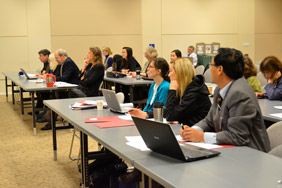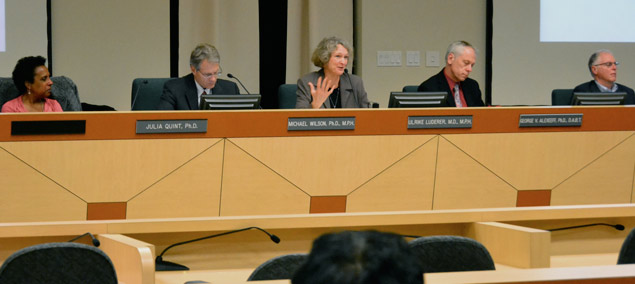 The Scientific Guidance Panel, a panel of expert scientists from outside of state government, plays a major role in the California Environmental Contaminant Biomonitoring Program (also known as Biomonitoring California).
The Scientific Guidance Panel, a panel of expert scientists from outside of state government, plays a major role in the California Environmental Contaminant Biomonitoring Program (also known as Biomonitoring California).
Role of the Panel
The role of the Panel is to:
- Make recommendations regarding the program’s design and implementation. This includes making specific recommendations regarding chemicals that are priorities for biomonitoring in California.
- Provide scientific peer review for Biomonitoring California.
Appointment of Panel members
The Panel has a total of 9 members. Appointment to the Panel is by the Governor (5 members) and the California Legislature (Speaker of the Assembly, 2 members; Senate Rules Committee, 2 members).
As required by SB 1379, persons appointed to the Scientific Guidance Panel must have expertise in one or more of the following areas: Public health, epidemiology, biostatistics, environmental medicine, risk analysis, exposure assessment, developmental biology, laboratory science, bioethics, maternal and child health (specialty in breastfeeding), and toxicology.
They oversee and make recommendations on how the program is developed and carried out.
Panel meetings are open to the public.

Scientific Guidance Panel Members
Name |
Affiliations |
Appointed by |
|
Distinguished Professor of Philosophy and faculty member of the Environmental Toxicology Graduate Program, UC Riverside |
Senate Rules Committee |
|
|
Assistant Professor of Environmental Health Sciences and the Fielding Presidential Chair in Health Equity, UC Los Angeles |
Senate Rules Committee |
|
|
Clinical Professor of Medicine and Pharmacy, School of Medicine, UC San Francisco |
Speaker of the Assembly |
|
|
Professor and Director of the National Institutes of Health West Coast Metabolomics Center, UC Davis |
Governor Brown |
|
|
Professor, Center for Occupational and Environmental Health, School of Medicine, UC Irvine |
Governor Brown |
|
|
Professor Emeritus, School of Public Health, UC Berkeley and Retired Affiliate, Lawrence Berkeley National Laboratory |
Governor Brown |
|
|
Associate Professor, Department of Obstetrics, Gynecology and Reproductive Sciences, UC San Francisco |
Speaker of the Assembly |
|
|
Professor, Graduate School of Public Health, San Diego State University |
Governor Brown |
|
|
Assistant Professor, UC San Diego |
Governor Brown |
Scientific Guidance Panel Member Biographies
Carl F. Cranor, Ph.D., M.S.L.
Dr. Carl Cranor is a Distinguished Professor of Philosophy and member of the faculty of the Environmental Toxicology Graduate Program at the University of California, Riverside. For 25 years his research has focused on philosophic issues concerning risks, science and the law. He is the author of Regulating Toxic Substances: A Philosophy of Science and the Law (Oxford, 1993), Toxic Torts: Science, Law and the Possibility of Justice (Cambridge, 2006), and Legally Poisoned: How the Law Puts Us at Risk from Toxicants (Harvard, 2011), as well as co-author of Identifying and Regulating Carcinogens (U.S. Congress, Office of Technology Assessment, 1987), and Valuing Health: Cost Effectiveness Analysis for Regulation (Institute of Medicine, 2006). His research has been supported by about $1 million in grants from the National Science Foundation, the University of California Toxic Substances Research and Teaching Program, and other agencies. He has served on California science advisory panels (Proposition 65 Scientific Advisory Panel, Electric and Magnetic Fields Panel, and Nanotechnology Panel) as well as on Institute of Medicine and National Academy of Sciences Committees. He is an elected fellow of the American Association for the Advancement of Science and the Collegium Ramazzini.
Lara Cushing, Ph.D., M.P.H.
Dr. Lara Cushing is an Assistant Professor of Environmental Health Sciences and the Fielding Presidential Chair in Health Equity at the University of California, Los Angeles. Her research focuses on patterns and health consequences of social inequalities in exposures to environmental hazards in the U.S. She has assessed the health consequences of environmental and climate-related exposures for pregnant women and infants, and investigated questions of environmental justice in the context of chemical body burden, air pollution and hazardous sites, urban greenspace, oil and gas drilling, drinking water quality, and climate change. She is interested in analytical methods to characterize the joint effects of environmental and social stressors on health that can inform efforts to reduce environmental health disparities. Dr. Cushing earned her M.P.H in Epidemiology and Ph.D. in Energy & Resources from the University of California, Berkeley and previously served on the faculty at San Francisco State University.
Timur S. Durrani, M.D., M.P.H., M.B.A.
Dr. Timur S. Durrani is a Professor of Clinical Medicine at the University of California, San Francisco (UCSF), serving as the Associate Chief of Occupational and Environmental and Climate Medicine. He is board-certified in Family Medicine, Preventive Medicine, Occupational Medicine, and Medical Toxicology. Dr. Durrani's clinical practice includes providing outpatient consultations for medical toxicology and caring for acutely poisoned patients. He is the director of the Western States Pediatric Environmental Health Specialty Unit (funded by the U.S EPA and the Agency for Toxic Substances and Disease Registry). His academic interests span occupational, environmental, reproductive, and pediatric toxicology, as well as clinical pharmacology. Dr. Durrani teaches medical, nursing and pharmacy students, as well as various graduate trainees. He is the faculty of record for Occupational Toxicology at UCSF and he also precepts residents and fellows at UCSF and during industrial hygiene site visits. He has publications in basic science and public health disciplines and has presented on neurotoxicology. He has also volunteered his medical expertise internationally and served with the U.S. Army in Afghanistan.
Oliver Fiehn, Ph.D.
Dr. Oliver Fiehn is Full Professor of Molecular and Cellular Biology at the University of California, Davis. He is Director of the West Coast Metabolomics Center of the National Institutes of Health, which is housed in the UC Davis Genome Center. He has pioneered developments and applications in comprehensive analysis of metabolism with over 110 publications to date, starting from 2000 onwards as group leader at the Max-Planck Institute in Potsdam, Germany. He is currently overseeing two laboratories with more than 25 staff members and 15 mass spectrometers. He is integrating new approaches and technologies to perform pathway-based mapping of metabolic regulation in response to genetic or environmental perturbations. He is performing active research in cancer metabolism, mitochondrial toxicity, metabolic diseases, databases and drug-response phenotyping. In his function on the board of directors of the Metabolomics Society, he has chaired efforts to establish metabolomic databases and libraries, to standardize metabolomic reports and has organized a range of workshops and conferences.
Ulrike Luderer, M.D., Ph.D., M.P.H.
Dr. Ulrike Luderer is Professor of Medicine in the Division of Occupational and Environmental Medicine in the Department of Medicine at the University of California at Irvine. She also holds secondary appointments in the Department of Developmental and Cell Biology and the Program in Public Health, and is the Director of the Environmental Toxicology Graduate Program. Dr. Luderer's research focuses on mechanisms of action of reproductive toxicants and on the roles of antioxidants and oxidative stress in reproductive toxicity and reproductive aging. She has served on several expert panels of the National Toxicology Program's Center for the Evaluation of Risks to Human Reproduction (now called the Office of Health Assessment and Translation), was a member of National Research Council and World Health Organization advisory committees, and has served on the U.S. EPA Science Advisory Board Environmental Health Committee.
Thomas McKone, Ph.D.
Dr. Thomas E. McKone is Professor Emeritus in the School of Public Health at the University of California, Berkeley and a Retired Affiliate at the Lawrence Berkeley National Laboratory (LBNL). Over his career, McKone’s research has focused on the development, use, and evaluation of models and data for human health and ecological risk assessments, and the health and environmental impacts of energy, industrial, and agricultural systems. In his post-retirement positions with the University of California, he is continuing research on exposure science, life-cycle impact assessment, and the health impacts of fossil fuel combustion. He has served six years on the EPA Science Advisory Board, has been a member of more than a dozen National Academy of Sciences (NAS) committees, and has been on consultant committees for the Organization for Economic Cooperation and Development (OECD), the World Health Organization, the International Atomic Energy Agency, and the Food and Agriculture Organization.
Amy Padula, Ph.D., M.Sc.
Amy Padula is an Associate Professor in the Department of Obstetrics, Gynecology and Reproductive Sciences at the University of California, San Francisco. Her expertise is in epidemiologic studies of environmental exposures, social inequalities, and adverse pregnancy outcomes. Dr. Padula was awarded the Outstanding New Environmental Scientist Award from the National Institute of Environmental Health Science to investigate the impact of wildfires on preterm birth in California. As part of the National Institute of Health’s Environmental influences on Child Health Outcomes (ECHO) study, she investigated associations between per- and polyfluoroalkyl substances (PFASs) and other endocrine disrupting chemicals in combination with social stressors during pregnancy and their effects on adverse birth and child health outcomes. She has worked with the Silent Spring Institute to report back individual chemical exposure to study participants using the Digital Exposure Response Back Interface. Dr. Padula received her PhD in Epidemiology from the University of California, Berkeley and her postdoctoral training at Stanford University.
Penelope (Jenny) Quintana, Ph.D., M.P.H.
Dr. Penelope (Jenny) Quintana is Professor of Public Health at San Diego State University Graduate School of Public Health. She has an M.P.H. from San Diego State University and a Ph.D. in Environmental Health Sciences from UC Berkeley. She has a research focus on exposures to children and vulnerable populations at the US-Mexico border. She has assessed children’s exposure to toxicants in house dust and on surfaces, for example residual tobacco toxicants remaining after smoking has taken place, known as third-hand smoke. In conjunction with researchers at Universidad Autónoma de Baja California, Tijuana, she has studied markers of DNA damage in placentas from a Tijuana hospital, and exposure to toxic traffic pollutants inside vehicles waiting in lines to cross the US-Mexico border. With the University of Washington, she has measured absorption of diesel pollutants through urinary analysis in pedestrians waiting in long lines northbound at the San Ysidro Port of Entry next to idling diesel buses. She is the author of a 2013 report drawing attention to the long northbound wait times and lines of idling vehicles at US-Mexico Ports of Entry as an environmental justice issue for border crossers and surrounding communities.
José R. Suárez, M.D., Ph.D., M.P.H.
Dr. José R. Suárez is an Assistant Professor in the Department of Family Medicine and Public Health at the University of California, San Diego. His research focuses on understanding the role of environmental contaminants on brain development and metabolic alterations of children and adults. He has conducted several studies of agricultural populations. He is the principal investigator of a longitudinal study (“ESPINA”) aimed at understanding associations between low-level exposures to pesticides and short- and long-term alterations in the development of children living in the agricultural county of Pedro Moncayo, Ecuador. He is involved in community-based participatory processes in Ecuador in which he and his group of collaborators are collecting community health surveys and mental health screenings of large rural populations. Dr. Suarez is also the principal investigator of a research trial that is testing the effect of dietary interventions on enhancing the excretion of persistent organic pollutants, such as PCBs, PBDE flame retardants and organochlorine pesticides among older adults in San Diego. Additionally, he is examining potential relationships between exposures to persistent organic pollutants (organochlorine pesticides, PCBs, PBDEs, and PBBs) and markers of oxidative stress, alterations in glucose and lipid metabolism, and subclinical heart disease in middle-aged adults (“CARDIA” study). Dr. Suárez earned his M.D. from Universidad San Francisco de Quito in Ecuador and his Ph.D. and M.P.H. from the University of Minnesota.


